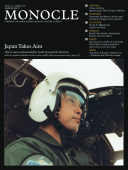
Issue 1
Japan Takes Aim: Asia’s most advanced fleet looks beyond the horizon. Monocle gains exclusive access to the world’s only non-existent navy.
In This Issue
Oops! No content was found.
Looks like we no longer have content for the page you're on. Perhaps try a search?
Return Home

